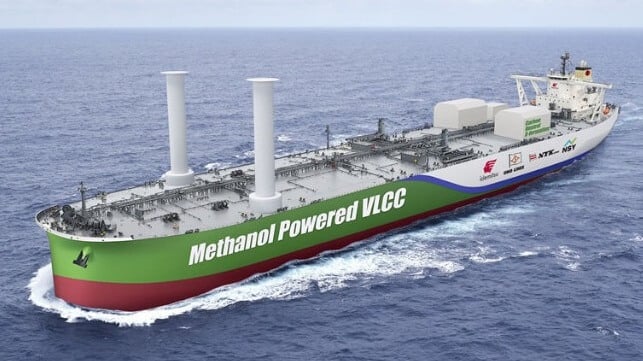Japanese Consortium Previews Design for Eco-Friendly VLCC Tanker

Four leaders from Japan’s maritime sector have been working in 2024 to develop design concepts for an eco-friendly VLCC tanker. The goal was to design an efficient vessel that could exceed regulatory requirements. They established a target of lowering emissions by more than 40 percent.
Idemitsu Tanker Co., IINO Kaiun Kaisha (IINO Lines), Nippon Yusen Kabushiki Kaisha (NYK), and Nihon Shipyard Co. released their design for a 309,000 dwt vessel measuring 1,114 feet (339.5 meters) reporting it would achieve the target of better than a 40 percent compared to the current baseline for emissions from a larger tanker.
The project selected the latest dual-fuel main engine that can use methanol and heavy oil as fuel. Among the other elements used to improve efficiency and reduce emissions, they incorporated shaft generators. While making the vessel design suitable for wind-assisted propulsion they report the wind propulsion system will be optional for the overall design. They considered technologies including Onboard Carbon Capture & Storage.
Idemitsu Tanker Co. initiated the project bringing in a leader shipbuilder along with colleagues from the shipping industry. The joint research and development of the design project focused on developing the concepts including the particulars, machinery, and environmental equipment for what they are calling the Malacca Max VLCC.
Noting that Japan imports 890 percent of its oil from the Middle East, one of the key considerations was creating the largest vessel type capable of passing through the Strait of Malacca, a major shipping route for crude oil between Japan and the Middle East.
Achieving a greater than 40 percent reduction, they highlight that a standard Phase III design would achieve only over a 30 percent reduction versus the baseline for VLCCs. Further, while methanol is expected to contribute an approximately 15 percent reduction compared to the use of conventional fuel oil, the study highlights the use of green methanol, such as bio-methanol produced from biomass and synthetic methanol (e-methanol) produced using hydrogen from renewable energy sources and captured CO2, will make it possible to reduce CO2 emissions to net zero.
The companies report they will conduct further studies based on the design concept to refine and advance their design. They aim for “strategically phased” shipbuilding orders for this next-generation eco-friendly VLCC and to allocate vessels to crude oil transport for Japanese refineries as soon as possible.
